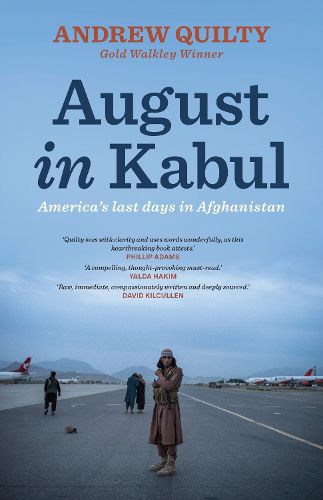Readings Newsletter
Become a Readings Member to make your shopping experience even easier.
Sign in or sign up for free!
You’re not far away from qualifying for FREE standard shipping within Australia
You’ve qualified for FREE standard shipping within Australia
The cart is loading…






As night fell on 15 August 2021, the Taliban entered Kabul, capital of Afghanistan. After a 20-year conflict with the United States, its Western allies and a proxy Afghan government, the Islamic militant group once aligned with al Qaeda was about to bury yet another foreign foe in the graveyard of empires. And for America, the superpower, this was yet another foreign disaster. As cities and towns fell to the Taliban in rapid succession, Western troops and embassy staff scrambled to flee a country of which they had lost control. To the world, Kabul in August looked like Saigon in 1975.
August in Kabul
is the story of how America’s longest mission came to an abrupt and humiliating end, told through the eyes of Afghans whose lives have been turned upside down: a young woman who harbours dreams of a university education; a presidential staffer who works desperately to hold things together as the government collapses around him; a prisoner in the notorious Bagram Prison who suddenly finds himself free when prison guards abandon their post.
Andrew Quilty was one of a handful of Western journalists who stayed in Kabul as the city fell. This is his first-hand account of those dramatic final days.
$9.00 standard shipping within Australia
FREE standard shipping within Australia for orders over $100.00
Express & International shipping calculated at checkout
As night fell on 15 August 2021, the Taliban entered Kabul, capital of Afghanistan. After a 20-year conflict with the United States, its Western allies and a proxy Afghan government, the Islamic militant group once aligned with al Qaeda was about to bury yet another foreign foe in the graveyard of empires. And for America, the superpower, this was yet another foreign disaster. As cities and towns fell to the Taliban in rapid succession, Western troops and embassy staff scrambled to flee a country of which they had lost control. To the world, Kabul in August looked like Saigon in 1975.
August in Kabul
is the story of how America’s longest mission came to an abrupt and humiliating end, told through the eyes of Afghans whose lives have been turned upside down: a young woman who harbours dreams of a university education; a presidential staffer who works desperately to hold things together as the government collapses around him; a prisoner in the notorious Bagram Prison who suddenly finds himself free when prison guards abandon their post.
Andrew Quilty was one of a handful of Western journalists who stayed in Kabul as the city fell. This is his first-hand account of those dramatic final days.
August of 2021 was a miserable month; maybe the worst one that I had ever had. The last and bleakest of Victoria’s lockdowns had started. Every bitter night on the news, between screaming matches about Australia’s Covid response and the steady drumbeat of a climbing death toll, footage from a country on the other side of the world terrified me; a nation in its death throes, tearing itself apart. The War in Afghanistan had finally come to an end.
Afghanistan once played a part in my own life, and I watched on in a desolate mood as cities that I had heard about fell swiftly to the Taliban, culminating in the lightning capture of Kabul. In his new book August in Kabul, Gold Walkley-winning photojournalist Andrew Quilty takes us into the final days of the War in Afghanistan and the catastrophic withdrawal of the international occupying forces.
Quilty knits this book together with differing perspectives from a variety of interview subjects, including then- National Security Advisor Hamdullah Mohib; the government’s media relations advisor Hamed Safi; Arman Malik, a Captain in the KKA; Taliban members Abujdajanah and Hejratullah; and Nadia Amini, a young woman whose family unravels as the country spirals out of control, with both dissolving into violence and despair. Quilty’s subjects are not the great and powerful; these are ordinary people battered by forces beyond their control. Through them, we witness the transition from the mounting unease at the speed of Taliban victories outside the capital, to the frenzied panic and terrifying desperation of those nightmare final days at Hamid Karzai International Airport.
August in Kabul’s building tension, frightening violence and fragmented perspectives reminded me of another journalist’s book on another futile war in Afghanistan; Nobel laureate Svetlana Alexievich’s monumental dirge Boys in Zinc. Now, a year after the war has ended, August in Kabul comes as a bitter coda to futile conflict, and it comes to us from the voices of shattered lives.
Explore the ideas and policies that have shaped our world.
Discover new Australian nonfiction books at Readings, with biography, memoir, essays and analysis.